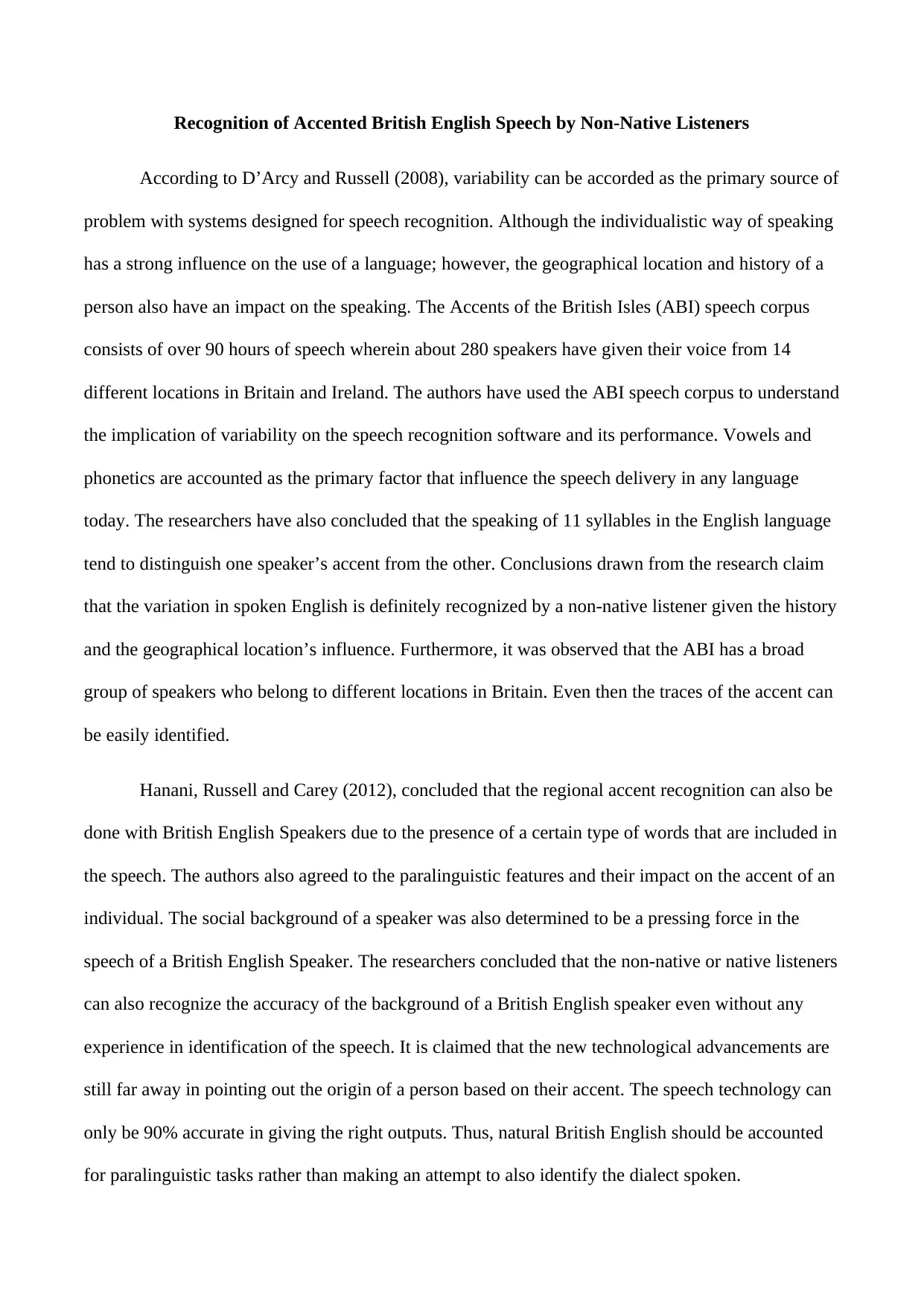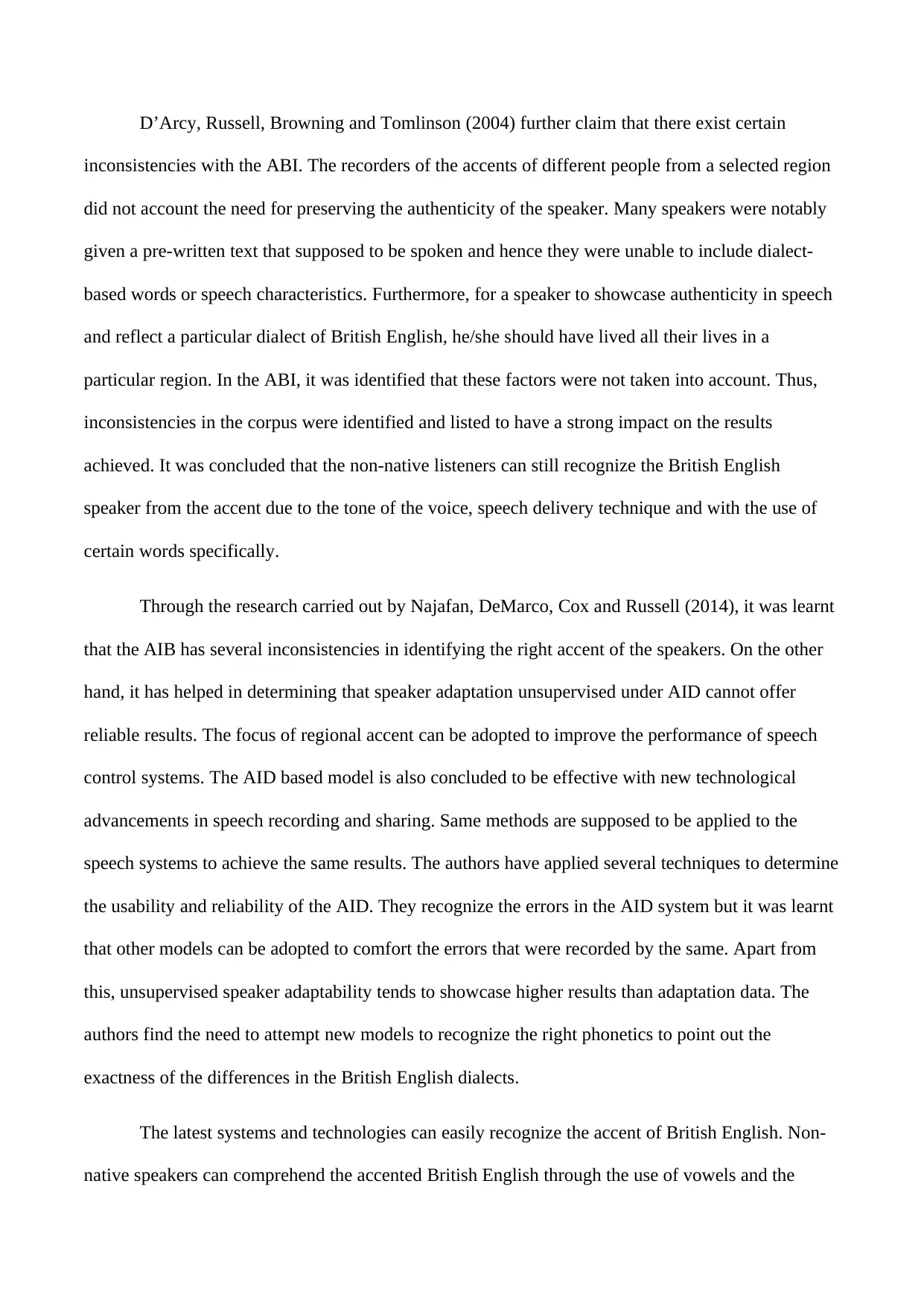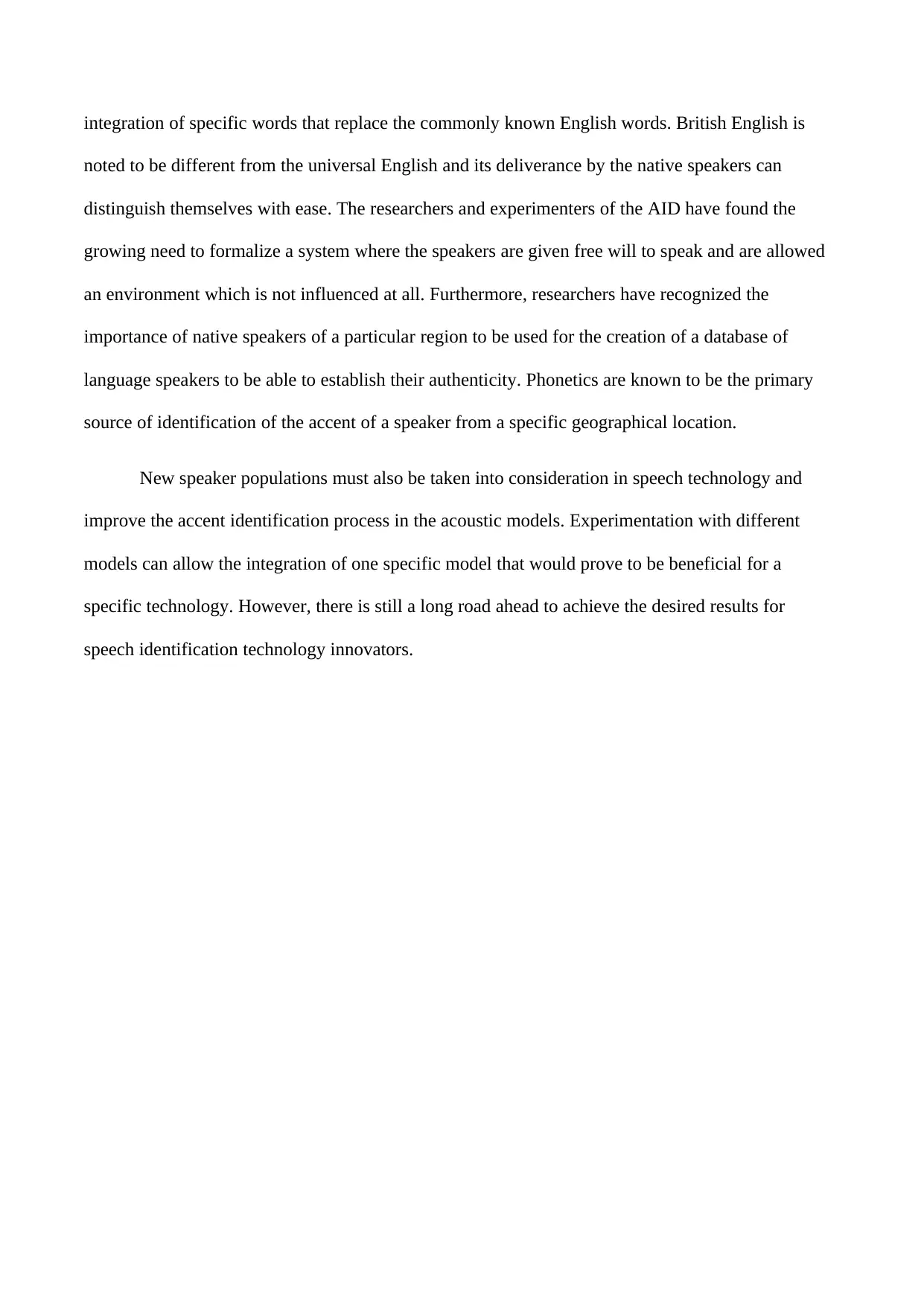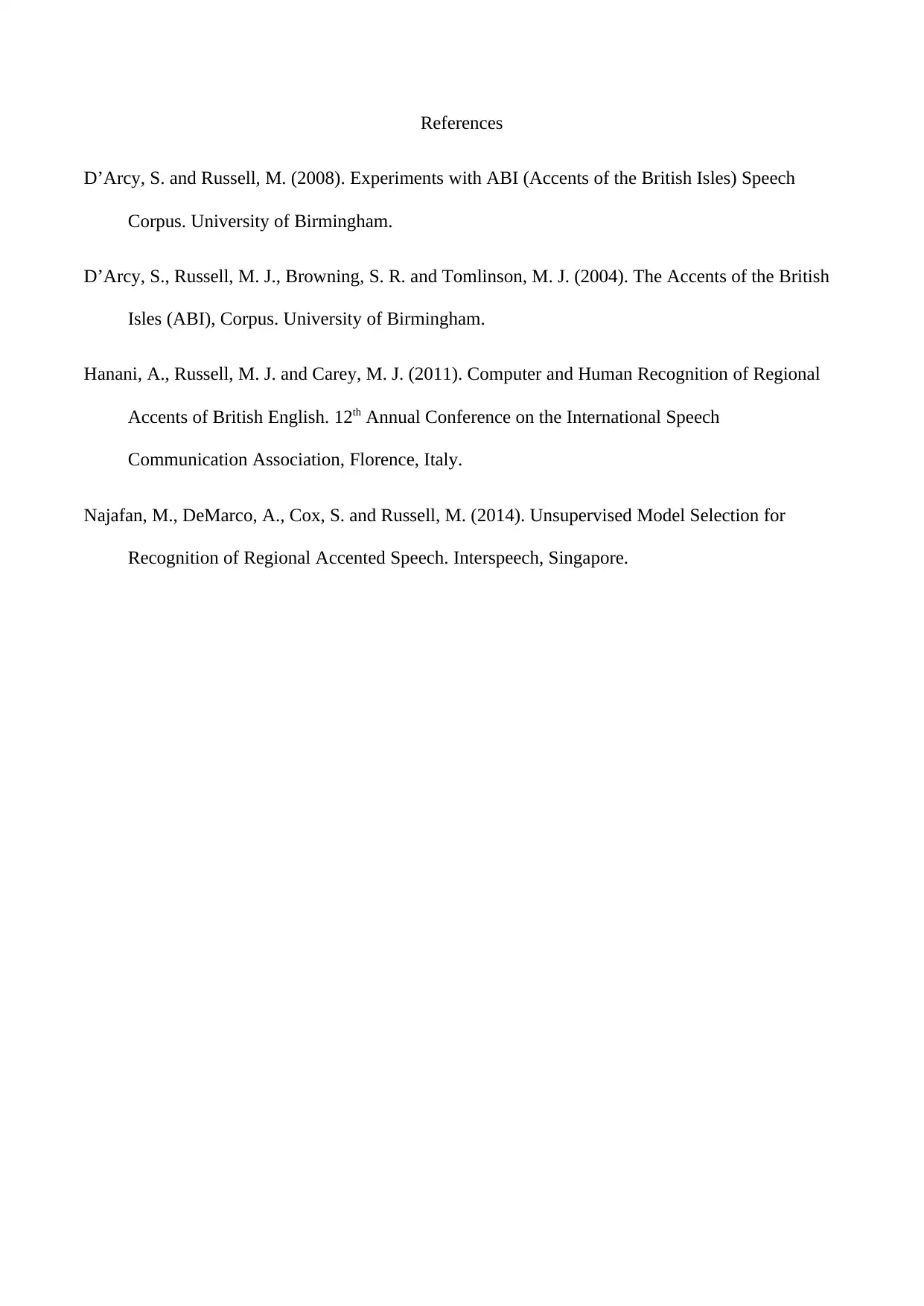Report on the Recognition of Accented British English Speech by AI
VerifiedAdded on 2022/08/18
|4
|1166
|14
Report
AI Summary
This report delves into the challenges and advancements in AI's ability to recognize accented British English speech. It examines the influence of geographical location, individual speech patterns, and phonetic variations on speech recognition systems. The report references key studies using the Accents of the British Isles (ABI) speech corpus, highlighting the importance of vowels, phonetics, and specific word usage in distinguishing accents. It discusses the ability of non-native listeners to identify accents, inconsistencies in the ABI corpus, and the potential of speaker adaptation techniques. The report also addresses the limitations of current speech technology, emphasizing the need for improved acoustic models and consideration of diverse speaker populations. The study underscores the ongoing efforts to enhance speech identification technology, with the aim of improving accuracy and reliability in recognizing regional accents within British English.

Recognition of Accented British English Speech by Non-Native Listeners
According to D’Arcy and Russell (2008), variability can be accorded as the primary source of
problem with systems designed for speech recognition. Although the individualistic way of speaking
has a strong influence on the use of a language; however, the geographical location and history of a
person also have an impact on the speaking. The Accents of the British Isles (ABI) speech corpus
consists of over 90 hours of speech wherein about 280 speakers have given their voice from 14
different locations in Britain and Ireland. The authors have used the ABI speech corpus to understand
the implication of variability on the speech recognition software and its performance. Vowels and
phonetics are accounted as the primary factor that influence the speech delivery in any language
today. The researchers have also concluded that the speaking of 11 syllables in the English language
tend to distinguish one speaker’s accent from the other. Conclusions drawn from the research claim
that the variation in spoken English is definitely recognized by a non-native listener given the history
and the geographical location’s influence. Furthermore, it was observed that the ABI has a broad
group of speakers who belong to different locations in Britain. Even then the traces of the accent can
be easily identified.
Hanani, Russell and Carey (2012), concluded that the regional accent recognition can also be
done with British English Speakers due to the presence of a certain type of words that are included in
the speech. The authors also agreed to the paralinguistic features and their impact on the accent of an
individual. The social background of a speaker was also determined to be a pressing force in the
speech of a British English Speaker. The researchers concluded that the non-native or native listeners
can also recognize the accuracy of the background of a British English speaker even without any
experience in identification of the speech. It is claimed that the new technological advancements are
still far away in pointing out the origin of a person based on their accent. The speech technology can
only be 90% accurate in giving the right outputs. Thus, natural British English should be accounted
for paralinguistic tasks rather than making an attempt to also identify the dialect spoken.
According to D’Arcy and Russell (2008), variability can be accorded as the primary source of
problem with systems designed for speech recognition. Although the individualistic way of speaking
has a strong influence on the use of a language; however, the geographical location and history of a
person also have an impact on the speaking. The Accents of the British Isles (ABI) speech corpus
consists of over 90 hours of speech wherein about 280 speakers have given their voice from 14
different locations in Britain and Ireland. The authors have used the ABI speech corpus to understand
the implication of variability on the speech recognition software and its performance. Vowels and
phonetics are accounted as the primary factor that influence the speech delivery in any language
today. The researchers have also concluded that the speaking of 11 syllables in the English language
tend to distinguish one speaker’s accent from the other. Conclusions drawn from the research claim
that the variation in spoken English is definitely recognized by a non-native listener given the history
and the geographical location’s influence. Furthermore, it was observed that the ABI has a broad
group of speakers who belong to different locations in Britain. Even then the traces of the accent can
be easily identified.
Hanani, Russell and Carey (2012), concluded that the regional accent recognition can also be
done with British English Speakers due to the presence of a certain type of words that are included in
the speech. The authors also agreed to the paralinguistic features and their impact on the accent of an
individual. The social background of a speaker was also determined to be a pressing force in the
speech of a British English Speaker. The researchers concluded that the non-native or native listeners
can also recognize the accuracy of the background of a British English speaker even without any
experience in identification of the speech. It is claimed that the new technological advancements are
still far away in pointing out the origin of a person based on their accent. The speech technology can
only be 90% accurate in giving the right outputs. Thus, natural British English should be accounted
for paralinguistic tasks rather than making an attempt to also identify the dialect spoken.
Paraphrase This Document
Need a fresh take? Get an instant paraphrase of this document with our AI Paraphraser

D’Arcy, Russell, Browning and Tomlinson (2004) further claim that there exist certain
inconsistencies with the ABI. The recorders of the accents of different people from a selected region
did not account the need for preserving the authenticity of the speaker. Many speakers were notably
given a pre-written text that supposed to be spoken and hence they were unable to include dialect-
based words or speech characteristics. Furthermore, for a speaker to showcase authenticity in speech
and reflect a particular dialect of British English, he/she should have lived all their lives in a
particular region. In the ABI, it was identified that these factors were not taken into account. Thus,
inconsistencies in the corpus were identified and listed to have a strong impact on the results
achieved. It was concluded that the non-native listeners can still recognize the British English
speaker from the accent due to the tone of the voice, speech delivery technique and with the use of
certain words specifically.
Through the research carried out by Najafan, DeMarco, Cox and Russell (2014), it was learnt
that the AIB has several inconsistencies in identifying the right accent of the speakers. On the other
hand, it has helped in determining that speaker adaptation unsupervised under AID cannot offer
reliable results. The focus of regional accent can be adopted to improve the performance of speech
control systems. The AID based model is also concluded to be effective with new technological
advancements in speech recording and sharing. Same methods are supposed to be applied to the
speech systems to achieve the same results. The authors have applied several techniques to determine
the usability and reliability of the AID. They recognize the errors in the AID system but it was learnt
that other models can be adopted to comfort the errors that were recorded by the same. Apart from
this, unsupervised speaker adaptability tends to showcase higher results than adaptation data. The
authors find the need to attempt new models to recognize the right phonetics to point out the
exactness of the differences in the British English dialects.
The latest systems and technologies can easily recognize the accent of British English. Non-
native speakers can comprehend the accented British English through the use of vowels and the
inconsistencies with the ABI. The recorders of the accents of different people from a selected region
did not account the need for preserving the authenticity of the speaker. Many speakers were notably
given a pre-written text that supposed to be spoken and hence they were unable to include dialect-
based words or speech characteristics. Furthermore, for a speaker to showcase authenticity in speech
and reflect a particular dialect of British English, he/she should have lived all their lives in a
particular region. In the ABI, it was identified that these factors were not taken into account. Thus,
inconsistencies in the corpus were identified and listed to have a strong impact on the results
achieved. It was concluded that the non-native listeners can still recognize the British English
speaker from the accent due to the tone of the voice, speech delivery technique and with the use of
certain words specifically.
Through the research carried out by Najafan, DeMarco, Cox and Russell (2014), it was learnt
that the AIB has several inconsistencies in identifying the right accent of the speakers. On the other
hand, it has helped in determining that speaker adaptation unsupervised under AID cannot offer
reliable results. The focus of regional accent can be adopted to improve the performance of speech
control systems. The AID based model is also concluded to be effective with new technological
advancements in speech recording and sharing. Same methods are supposed to be applied to the
speech systems to achieve the same results. The authors have applied several techniques to determine
the usability and reliability of the AID. They recognize the errors in the AID system but it was learnt
that other models can be adopted to comfort the errors that were recorded by the same. Apart from
this, unsupervised speaker adaptability tends to showcase higher results than adaptation data. The
authors find the need to attempt new models to recognize the right phonetics to point out the
exactness of the differences in the British English dialects.
The latest systems and technologies can easily recognize the accent of British English. Non-
native speakers can comprehend the accented British English through the use of vowels and the

integration of specific words that replace the commonly known English words. British English is
noted to be different from the universal English and its deliverance by the native speakers can
distinguish themselves with ease. The researchers and experimenters of the AID have found the
growing need to formalize a system where the speakers are given free will to speak and are allowed
an environment which is not influenced at all. Furthermore, researchers have recognized the
importance of native speakers of a particular region to be used for the creation of a database of
language speakers to be able to establish their authenticity. Phonetics are known to be the primary
source of identification of the accent of a speaker from a specific geographical location.
New speaker populations must also be taken into consideration in speech technology and
improve the accent identification process in the acoustic models. Experimentation with different
models can allow the integration of one specific model that would prove to be beneficial for a
specific technology. However, there is still a long road ahead to achieve the desired results for
speech identification technology innovators.
noted to be different from the universal English and its deliverance by the native speakers can
distinguish themselves with ease. The researchers and experimenters of the AID have found the
growing need to formalize a system where the speakers are given free will to speak and are allowed
an environment which is not influenced at all. Furthermore, researchers have recognized the
importance of native speakers of a particular region to be used for the creation of a database of
language speakers to be able to establish their authenticity. Phonetics are known to be the primary
source of identification of the accent of a speaker from a specific geographical location.
New speaker populations must also be taken into consideration in speech technology and
improve the accent identification process in the acoustic models. Experimentation with different
models can allow the integration of one specific model that would prove to be beneficial for a
specific technology. However, there is still a long road ahead to achieve the desired results for
speech identification technology innovators.
⊘ This is a preview!⊘
Do you want full access?
Subscribe today to unlock all pages.

Trusted by 1+ million students worldwide

References
D’Arcy, S. and Russell, M. (2008). Experiments with ABI (Accents of the British Isles) Speech
Corpus. University of Birmingham.
D’Arcy, S., Russell, M. J., Browning, S. R. and Tomlinson, M. J. (2004). The Accents of the British
Isles (ABI), Corpus. University of Birmingham.
Hanani, A., Russell, M. J. and Carey, M. J. (2011). Computer and Human Recognition of Regional
Accents of British English. 12th Annual Conference on the International Speech
Communication Association, Florence, Italy.
Najafan, M., DeMarco, A., Cox, S. and Russell, M. (2014). Unsupervised Model Selection for
Recognition of Regional Accented Speech. Interspeech, Singapore.
D’Arcy, S. and Russell, M. (2008). Experiments with ABI (Accents of the British Isles) Speech
Corpus. University of Birmingham.
D’Arcy, S., Russell, M. J., Browning, S. R. and Tomlinson, M. J. (2004). The Accents of the British
Isles (ABI), Corpus. University of Birmingham.
Hanani, A., Russell, M. J. and Carey, M. J. (2011). Computer and Human Recognition of Regional
Accents of British English. 12th Annual Conference on the International Speech
Communication Association, Florence, Italy.
Najafan, M., DeMarco, A., Cox, S. and Russell, M. (2014). Unsupervised Model Selection for
Recognition of Regional Accented Speech. Interspeech, Singapore.
1 out of 4
Your All-in-One AI-Powered Toolkit for Academic Success.
+13062052269
info@desklib.com
Available 24*7 on WhatsApp / Email
![[object Object]](/_next/static/media/star-bottom.7253800d.svg)
Unlock your academic potential
Copyright © 2020–2026 A2Z Services. All Rights Reserved. Developed and managed by ZUCOL.
